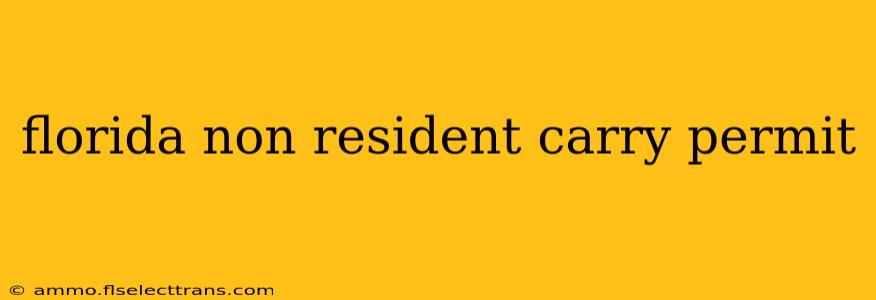Florida's relatively permissive concealed carry laws attract many non-residents. Obtaining a Florida non-resident concealed weapons license (CWL) can significantly expand your ability to carry a firearm legally in the Sunshine State and other reciprocal states. However, the process isn't straightforward, and understanding the requirements is crucial. This guide will walk you through everything you need to know to successfully navigate the application process.
Eligibility Requirements for Non-Residents
Before you begin the application, ensure you meet all the eligibility criteria. Failing to meet these requirements will result in a denied application, wasting your time and money. Key requirements include:
- Legal US Resident: You must be a legal resident of the United States.
- Age Requirement: You must be at least 21 years old.
- State Residency: While you don't need to be a Florida resident, you must reside in a state that allows you to legally possess a firearm. Your home state's laws will significantly impact your eligibility.
- Clean Background Check: A comprehensive background check is conducted, and any felony convictions, domestic violence misdemeanors, or certain other offenses will disqualify you. You should carefully review Florida's disqualifying factors before applying.
- Firearms Training: You'll need to complete a state-approved firearms training course that meets Florida's specific requirements. This usually includes both classroom instruction and a live-fire shooting range portion. The specific requirements for the course vary, so ensure you choose a course that meets the Florida standards.
- Application Fee: You'll need to pay the required application fee. This fee is subject to change, so check the official Florida Department of Agriculture and Consumer Services (FDACS) website for the most up-to-date information.
Steps to Obtain a Florida Non-Resident Concealed Weapons License
The application process involves several steps:
-
Complete the Application: Download and complete the official Florida CWL application form. Accuracy is paramount; any errors could delay or prevent approval.
-
Firearms Training: Complete a state-approved firearms training course. Obtain and retain your certificate of completion, as this is a crucial part of your application.
-
Fingerprinting: Get fingerprinted by a licensed and approved Florida fingerprinting vendor. The application will specify requirements for this process.
-
Photographs: Submit two recent passport-style photographs. Follow the specifications outlined in the application instructions carefully.
-
Background Check: Understand that a thorough background check will be conducted. This includes a review of your criminal history, mental health records, and other relevant information.
-
Submit Application and Fees: Submit the completed application, supporting documents (including training certificate and fingerprinting results), and the application fee to the FDACS.
-
Processing and Approval: Allow sufficient processing time. The timeframe can vary, so be patient. You will receive notification of approval or denial.
Reciprocity with Other States
A crucial aspect of obtaining a Florida non-resident CWL is understanding its reciprocity with other states. Florida has reciprocity agreements with numerous states, meaning your Florida license allows you to legally carry a concealed firearm in those states. However, it's essential to check the specific laws of each state you plan to visit, as requirements and restrictions may vary. The laws regarding reciprocity are constantly evolving; therefore, it’s vital to verify the current status before traveling.
Potential Challenges and Considerations
The process of obtaining a Florida non-resident CWL can present challenges. Understanding these potential hurdles can help you prepare effectively:
- Disqualifying Factors: Thoroughly review the disqualifying factors before applying. Any undisclosed information could lead to application denial.
- Processing Time: The application process can take time. Be prepared for potential delays.
- Reciprocity Limitations: Always verify reciprocity with each state you plan to visit before traveling.
Conclusion
Obtaining a Florida non-resident concealed carry permit is a significant undertaking, requiring careful planning and attention to detail. By thoroughly understanding the eligibility requirements, completing the necessary steps accurately, and staying informed about reciprocity laws, you can successfully navigate the application process and enjoy the benefits of legal concealed carry in Florida and other reciprocal states. Remember to always consult the official FDACS website for the most up-to-date information and regulations.

